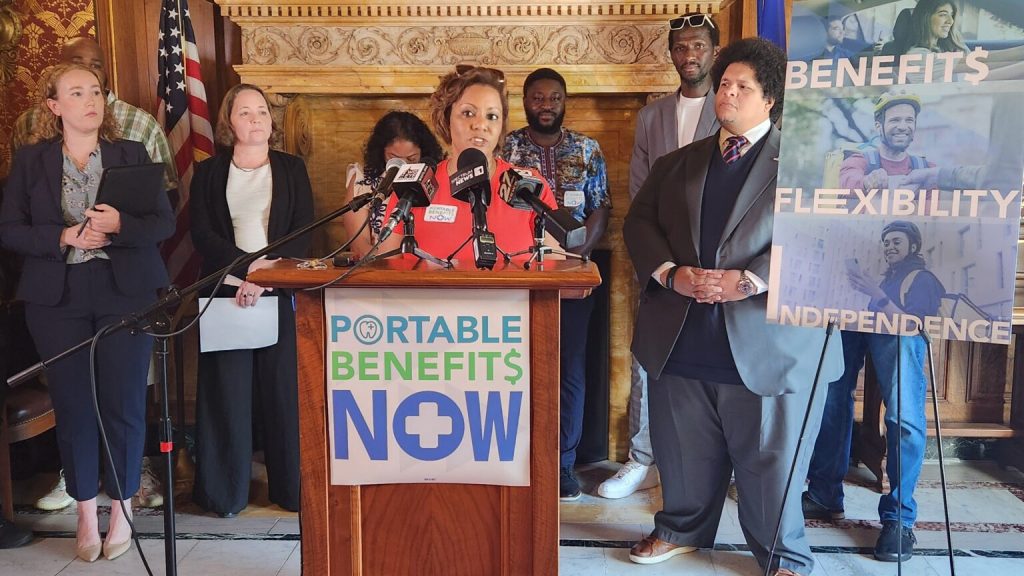Will Evers Sign Bill Making Gig Drivers Independent Contractors?
Would exclude Uber, Lyft, DoorDash drivers from rules protecting workers.

At a news conference Tuesday in the state Capitol, Rachel Smith of New Berlin speaks in favor of a bill that would make app-based drivers independent contractors and allow the businesses they drive for to provide some benefits. The bill was authored by Sen. Julian Bradly, on the right. (Photo by Erik Gunn/Wisconsin Examiner)
Backers of legislation that would block drivers from app-based rideshare and delivery businesses from being declared employees are making a full-court press to persuade Gov. Tony Evers to sign the measure into law.
If enacted, AB 269 would automatically classify drivers for Uber, Lyft, DoorDash and similar businesses as independent contractors — bypassing current Wisconsin laws that differentiate independent contractors from direct employees. It would exclude those drivers from Wisconsin’s unemployment insurance, workers compensation and minimum wage laws.
The bill would also allow those businesses to set up payroll plans to fund benefit programs for drivers, but it would not require them to do so.
Along with other bills that passed both houses after May 8, the Legislature’s calendar requires the independent contractor measure to go to Evers on Thursday, Aug. 7. Evers hasn’t spoken publicly about the bill, but opponents contend it deprives drivers of worker protections in return for meager benefits.
“It just seems to be a PR move to entrench drivers’ status as independent contractors,” said state Rep. Ryan Clancy (D-Milwaukee), who drives for Lyft and who voted against the bill in the Assembly.
A heavy lobbying campaign for which DoorDash has been the most visible sponsor has put all the attention on the benefits provision. On Tuesday, Chamber for Progress, a tech business lobbying group, organized a press conference in the state Capitol to urge Evers to sign the bill.
State Sen. Julian Bradley (R-New Berlin), the bill’s Senate author, said it would allow the driving-app companies “to voluntarily contribute to portable benefit accounts that travel with the worker and allow them to use the funds for health care, sick time or retirement without stripping workers of their independence.”
Gig workers “want to be independent,” said Ruth Whittaker, of Chamber for Progress. “We should protect their independence and the flexibility of gig work, and we should also give them access to benefits.”
Joe DeRose, a retired state employee, said his work driving for DoorDash provided “flexible income to help with rising costs” without tying him to a fixed schedule.
“I strongly support portable benefits,” DeRose said. “These accounts would let app-based workers save for unforeseen events or retirement without giving up the flexibility that makes this work so appealing.”
Rachel Smith of New Berlin said she delivers for DoorDash while building an online wellness business.
“The reality is, like many entrepreneurs and independent workers, I don’t have access to traditional benefits, so this portable benefits legislation would change that,” Smith said. “Portable benefits would let me plan for my future without giving up the freedom that makes this work possible in the first place.”
“Without this offer, there are no portable benefits,” said state Rep. Sylvia Ortiz-Velez (D-Milwaukee), who cast the only Democratic vote for the bill in the Assembly. “This is something that the platforms are wanting to do on their own, and government should not stand in their way of doing what they know is right.”
While Evers hasn’t said whether he’ll sign or veto the bill, its passage with only Republican votes — besides that of Ortiz-Velez — has almost always been a precursor to a veto.
Wisconsin labor laws include a series of tests to determine if a worker is an independent contractor or an employee.
An employee is covered by unemployment insurance, workers compensation insurance and state labor standards that include minimum wage, work hours and overtime regulations. An independent contractor is not.
The worker-business relationship must meet each one of nine qualifications to be exempt from workers comp law. It must meet 6 out of 9 qualifications to be exempt from unemployment insurance. And it must meet all six qualifications to be exempt from the state’s wage and hour laws.
The bill would make the app-based rideshare and delivery companies automatically exempt from all three areas of employment law.
They could lose the exemption only if they flunked all four parts of a new four-part test — by prescribing when drivers must be logged in; terminating a driver for turning down an assignment; restricting drivers from working for other app-based companies; and restricting drivers from any other lawful job or business.
“This is a dangerous bill for working people,” Stephanie Bloomingdale, president of the Wisconsin AFL-CIO, said Tuesday.
“It is a bill that will carve out our existing tests to determine unemployment, workers’ comp, wage and hour [standards] with a very simplistic four-part test that would forever remove drivers’ ability to access those kind of benefits that we fought for for decades,” Bloomingdale said in an interview.
“They could offer benefits without taking away these tests,” she added. “And what they’re really after is taking away these tests.
Although Bradley described the bill as giving Wisconsin gig drivers “access to benefits like health care, dental and retirement savings,” critics say that those kinds of benefits are unlikely to accrue under the system the law describes.
In Pennsylvania, DoorDash has established a trial benefits program without a law in place there. A report commissioned for the program found that participants on average were able to save about $400 over the course of a year.
“It’s just a savings account with a very meager contribution from the companies,” said Laura Padin, director of Work Structures at the National Employment Law Project (NELP), who sent a letter to Evers urging him to veto the bill. “Real employment-based benefits are worth so much more than that.”
Backers push Evers to sign bill declaring gig drivers independent contractors was originally published by the Wisconsin Examiner.
If you think stories like this are important, become a member of Urban Milwaukee and help support real, independent journalism. Plus you get some cool added benefits.
Transportation
-
Congestion Pricing Cuts Air Pollution in New York City
 Dec 14th, 2025 by Jeff Wood
Dec 14th, 2025 by Jeff Wood
-
FTA Tells Milwaukee to Crack Down on Fare Evasion — Even Where Fares Don’t Exist
 Dec 12th, 2025 by Graham Kilmer
Dec 12th, 2025 by Graham Kilmer
-
Will GOGO’s Bus Service Ever Get Going?
 Dec 9th, 2025 by Jeramey Jannene
Dec 9th, 2025 by Jeramey Jannene






















Tony Xu, CEO of DoorDash, net worth $3 billion. Dara Khosrowshahi, CEO of Uber, net worth $240 million. Both are immigrants to the US (cool on that) but what is with these rich guys working (lobbying) their hardest to keep worker wages down and their compensation up? Just the American way I guess. Cool beans!
Gotta keep paying dividends to the shareholders. Bah! The least that bill’s authors could have done is to make the portable benefits mandatory and set a min contribution requirement. These cos don’t want the expense of paying for unemployment and workers compensation? Well guess what. They’re still your employees because you make it possible to find the gigs. If you don’t supply one way, it should be another.
As if these companies are lobbying for this change out of the benevolence of their hearts and not because it saves them money and protects them from liability (i.e. responsibility). That’s the only way these companies even come close to being profitable.